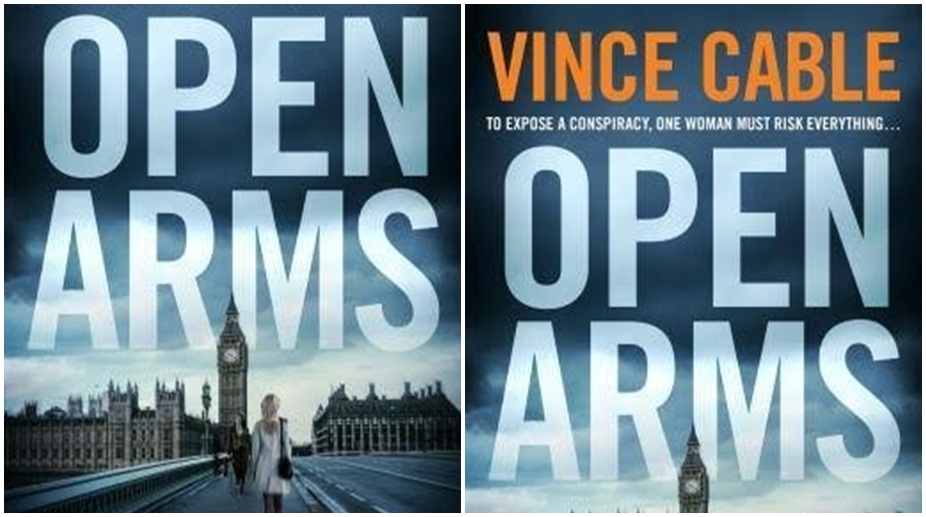Title: Open Arms
Author: Vince Cable
Publisher: Corvus/Atlantic Books
Pages: 400
Price: Rs 599
It is often conjectured if the reason for long-standing conflicts and insurgencies, in the developing world, especially South Asia, is not only other powers fishing in troubled waters but also the keenness of arms industries, mostly Western, to not lose two eager customers. How far can this powerful, unaccountable and unscrupulous military-industry complex go to maintain its market?
Quite far in subversion, sabotage and even more drastic measures to achieve its goals of huge profits as veteran British politician Vince Cable recounts in this story that seems ripped from today’s headlines.
And what can British housewife-turned-politician Kate Thompson, beleaguered Indian businessman Deepak Parrikar, a lovelorn union leader Steve Grant and Muslim accountant Shaida Khan do to counter the overwhelming adversary, with its links to high power echelons and violent criminals, ranged against them?
Set against the backdrop of the long-running, toxic rivalry in the South Asian subcontinent, Cable’s tale is set in the near future — in 2019 — where relations between India and Pakistan have again deteriorated alarmingly.
As the tension plays out (shown by a piece of “news” reporting some incident of outrage and threats from both sides beginning each chapter), the situation is further complicated by the less than salubrious influence of US arms firms, venal business magnates and extremist politicians to spin an alarming account of how democracies may actually work and the covert, vested interests that influence global developments.
Adding to the already virulent brew, being prepared across both Britain and India, are a host of rabid fanatics — both Islamist and right-wing communal xenophobes — manipulative politicians at all levels, alienated immigrants, doctrinaire trade unionists, oblivious bureaucrats and a sensationalist and/or partisan press.
Thompson is a rather glamorous housewife, who living in a barely formal marriage to a rich businessman, decides to take a plunge into politics, joining the Tory party. But after being elected MP, she finds herself rising at a rate she could have never imagined to be made a junior minister in the Trade Ministry and sent to India to clinch a lucrative arms deal.
But, her meeting with second-generation Indian businessman Parrikar whose company will be a crucial partner in the contract, is not only professionally successful but personally too. However, it leads to a lot of complications for her both in her life and career.
For Parrikar and his family, especially his rather enterprising father, who came up through a gray process, are in the cross-hairs of political and criminal enemies and their travails will not leave her unscathed.
Meanwhile, back in Britain, the company which was supposed to be the British end of the deal, is facing its own set of problems, with a takeover bid by a shadowy American conglomerate, and opposition to its agreements with India by peace and pro-Pakistan activists (different sections, of course) — and Grant and Shaida must see what it portends. A subplot is radicalism among Muslim youth, particularly Shaida’s brother.
Both these worlds, the fate of our characters (and many other rather unsympathetic ones), and the future of the nations come to a thrilling climax, after a trail of twists and turns through the corridors of political and corporate power in Delhi, and London, the high-rises and slums of Mumbai, and inner-city areas of many northern British cities.
Cable, a sitting Liberal Democrat MP who was Business Secretary in the coalition government from 2010-2015, draws on his own experiences of British politics and administration to provide a good feel of the push and pull that can influence even the functioning of well-entrenched democracies.
And though he has a good experience of India, he slips in a couple of places or so — the rank of a Mumbai police officer who plays a key role, the name of an Indian minister that seems incongruous, among others.
An entrancing read, it however sometimes seems there are too many subplots; some cliff-hangers end with a whimper than a bang, and the ending seems a bit hurried. However, since it is Cable’s first novel — after three non-fiction works — it seems possible we might meet some of these characters again.











